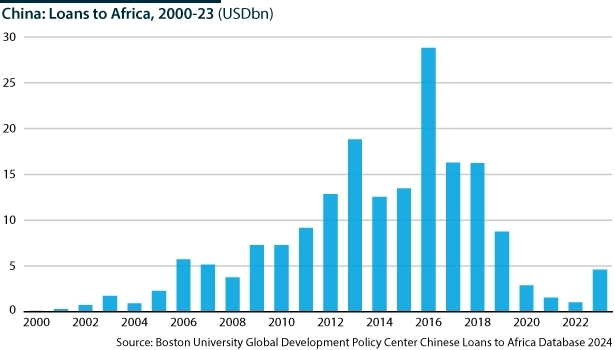Beijing sought to underscore its commitment to Africa during its flagship China-Africa development conference
The ninth edition of the Forum on China-Africa Cooperation (FOCAC) took place on September 4-6 in Beijing. This was the largest FOCAC event ever, bringing together leaders of 53 African countries and their Chinese counterparts. The event aimed to reinvigorate the Sino-African relationship after a tumultuous half-decade; however, significant questions regarding debt and the character of trade relations remain.
What next
Subsidiary Impacts
- FOCAC did not feature any debt relief or restructuring deals, but the nature of the pledge package was more diverse than previous editions.
- New scholarships and training opportunities offered by China aim to cement its influence on the continent.
- FOCAC also produced promises of trade liberalisation in the agricultural sector, part of Xi’s promise to create 1 million jobs in Africa.
- Rhetoric on shared histories of marginalisation and alternative development paths responds to growing geopolitical competition over Africa.
Analysis
FOCAC has been the premier event in China-Africa relations since its inception in 2000. At its broadest, the forum serves as the central arena for policy coordination, discussion and cooperative projects between the different actors.
Although the official programme is dominated by high-level consultations and pronouncements involving heads of state and top diplomats, the summit also facilitates numerous bilateral diplomatic meetings and gatherings between Chinese state-owned enterprises and African ministries.
For example, the South African delegation visited BYD — the world’s largest electric vehicle manufacturer — in the hopes of securing an investment in the country. FOCAC has therefore emerged as a major cog in the geoeconomics of Sino-African relations.
FOCAC is central to the geoeconomics of Sino-African relations
Historically, China has used the triennial meeting to craft its agenda, focus its messaging and announce significant initiatives in the Sino-African space.
For example, the 2006 meeting saw the establishment of the China-Africa Development Fund to support Chinese firms in their investments on the continent. Similarly, recent meetings have all ended with major pledges of funds for African development.
African countries, meanwhile, have used FOCAC both to build relationships with Chinese actors and press their own agendas. Notably, infrastructure and logistics projects played a major role in past FOCACs, reflecting African countries’ infrastructural ambitions, as well as Beijing’s appetite for African exports and desire to find profitable ventures for Chinese construction companies (see CHINA/AFRICA: Policy shift will be mainly symbolic – September 5, 2018).
However, the continent’s growing debts to China and other lenders have prompted a shift in focus toward smaller projects in recent years. In numerical terms, Chinese lending to Africa peaked in 2016 at nearly USD30bn before falling to USD1.6bn in 2022; 2023 was the first year lending had risen again in nearly a decade.
Return to form?
The overall tone at FOCAC 2024 marked a stark departure from the 2021 edition in Dakar, Senegal, which was constrained by COVID-19.
In contrast to the 2015 and 2018 editions that were designated as leadership summits, the 2021 meeting was downgraded to a ministerial-level meeting. Moreover, China’s commitments also fell significantly from earlier editions; for example, educational and training opportunities were reduced from 50,000 in the 2018 edition to 10,000 in 2021 and total pledges went from USD60bn to roughly USD40bn (see CHINA/AFRICA: Beijing’s influence will grow – February 18, 2022).
FOCAC 2024 represented a return to both the content and atmosphere of earlier editions. The conference theme of ‘Joining Hands to Advance Modernisation and Build a High-Level China-Africa Community with a Shared Future’ reflects the discourses in which FOCAC has traditionally been embedded — in particular joint histories of colonial oppression and the pursuit of economic development.
Indeed, from the highly choreographed opening ceremony to the welcome banquet or the content of President Xi Jinping’s speech, the event strove to present an atmosphere of equality and unity, despite the glaring power differentials between China and the various African countries present.
Beyond this political theatre, several meaningful initiatives emerged from the meeting. Foremost among these were the elevation of all African countries to ‘strategic partner’ status, a ten-point action plan for 2024-27, and an agreement to undertake a USD1bn refurbishment of the TAZARA railway.
Regarding the first, Xi’s decision to upgrade Sino-African ties comes amid increasing economic competition on the continent. New projects such as the Lobito Corridor connecting the copper fields of Zambia and the Democratic Republic of the Congo (DRC) to the Atlantic coast signal the return of Western interest in Africa (see AFRICA: Appetite for minerals may boost infrastructure – February 28, 2024).
Moreover, Africa is also attracting increasing investments and trade initiatives from non-traditional partners such as the United Arab Emirates, India, Qatar and Turkey (see AFRICA: Summits highlight region’s growing importance – September 29, 2022).
By officially upgrading relations with all African countries, Beijing seeks to signal that the continent remains central to its foreign policy goals. This is particularly significant considering the questions raised regarding Beijing’s commitments to Africa following FOCAC 2021.
Xi also laid out a plan to guide Sino-African relations over the next three years. This includes the USD50bn of promised financial support, the implementation of 30 “small yet smart” infrastructure projects, 30 green energy projects and 60,000 new scholarships for students and training opportunities.
China also notably pledged increased security assistance, with Xi claiming that China will play a more active role in African stability through the training of 6,000 military personnel, 1,000 police officers and the provision of CNY1bn (USD140mn) in military assistance grants.
Finally, the promised refurbishment of the TAZARA railway, which connects central Zambia to Tanzania’s Dar es Salaam port, will serve as both an alternate export route (vis-a-vis Lobito) for mining firms in Central Africa’s ‘Copperbelt’ region. It also foregrounds China’s historic commitments to Africa: the original TAZARA was built by the Chinese after Rhodesia declared independence as a white-minority rule country in the mid-1960s and threatened to cut off Zambia’s access to the sea.
Neglected concerns?
Although the meeting predictably focused on what are seen as the positive elements of the Sino-African relationship, many significant issues remain unresolved.
Many significant issues remain unresolved
Ultimately, FOCAC 2024 aimed to stress two major points: firstly, that Africa remains very important to China; and, secondly, that the relationship has evolved, in both status and focus. However, although the narratives of equality and win-win partnerships do create some space for African actors, the underlying power differentials remain fundamentally unchanged, meaning that China ultimately dictates the tone and the terms of the relationship.

President Xi Jinping delivers the keynote address at the Forum on China-Africa Cooperation, September 5, 2024 (Xinhua/Shutterstock)
Authored by:

Dr Matt Ward
Africa

Dr Nathaniel Powell
Africa



